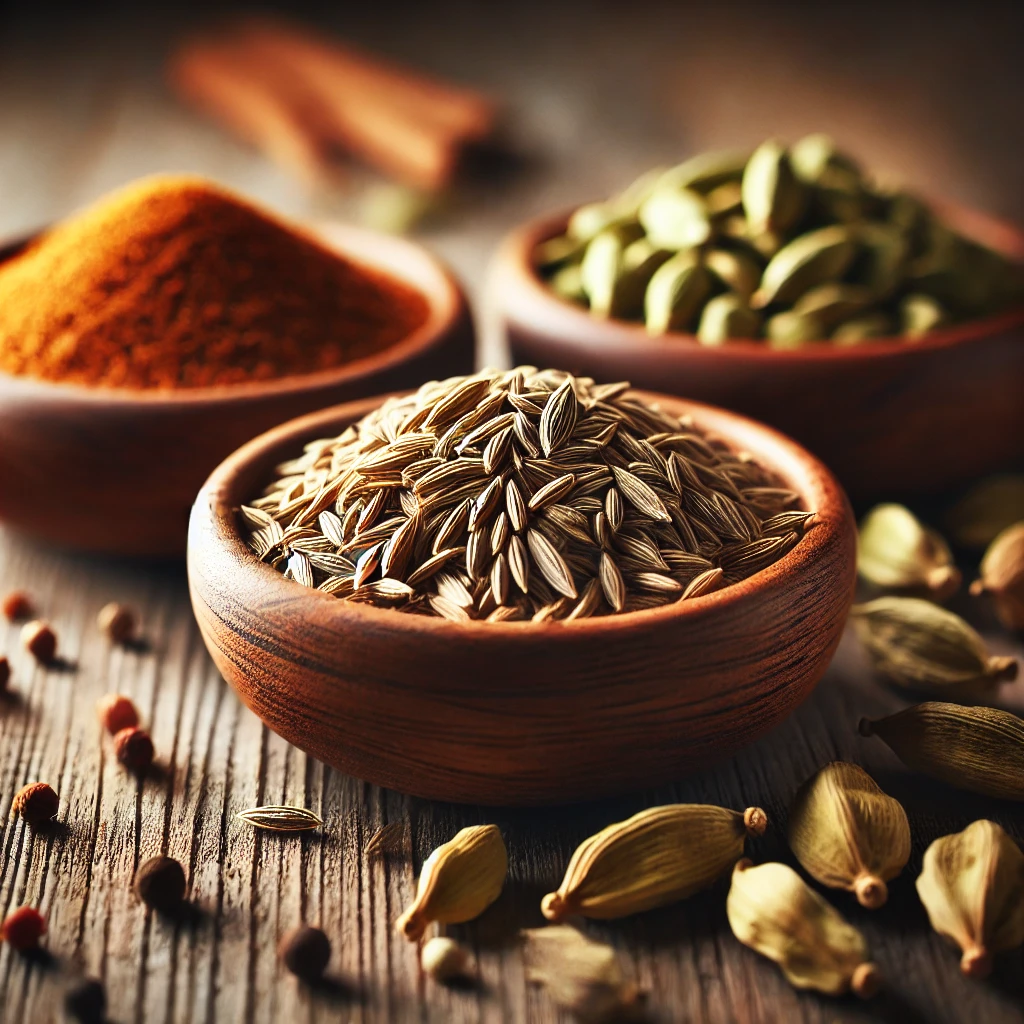Discover the power of natural remedies with spices that support digestive health. Learn how common kitchen spices like ginger, turmeric, and fennel can alleviate digestive discomfort, promote gut health, and improve overall digestion with simple, effective methods.
Read More: Boost Immune System: How Hazir Spices Can Help
Introduction
Digestive health plays a crucial role in overall well-being, influencing everything from nutrient absorption to immunity. Instead of relying solely on medications, many people are turning to natural remedies to ease digestive discomfort. One of the most effective approaches is incorporating certain spices into daily meals. These spices, readily available in most kitchens, have been used for centuries in traditional medicine to support digestion.
Read More: Hazir Masalas: Creative Uses in Everyday Cooking
In this article, we’ll explore some of the best spices for digestive health, how they work, and simple ways to incorporate them into your diet.

Top Spices for Digestive Health
| Spice | Digestive Benefits | How to Use |
|---|---|---|
| Ginger | Reduces nausea, aids digestion, and soothes the stomach | Add to tea, soups, or stir-fries |
| Turmeric | Anti-inflammatory properties, supports gut health | Use in curries, smoothies, or golden milk |
| Fennel | Relieves bloating, gas, and indigestion | Chew fennel seeds or brew as a tea |
| Peppermint | Relaxes the digestive tract, alleviates IBS symptoms | Drink as tea or use in desserts |
| Cumin | Stimulates digestive enzymes, reduces bloating | Add to lentils, rice, or vegetable dishes |
| Coriander | Aids in reducing acid reflux and promotes digestion | Use in chutneys, salads, or soups |
| Cardamom | Helps in breaking down food, alleviates indigestion | Add to tea, desserts, or rice dishes |
1. Ginger: The Digestive Soother
Ginger is a powerful root known for its anti-nausea and digestive properties. It contains compounds like gingerol and shogaol, which help stimulate saliva and bile production, aiding in the breakdown of food.
How to Use:
- Make fresh ginger tea by boiling sliced ginger in water.
- Add grated ginger to stir-fries or soups.
- Mix ginger powder with honey as a quick digestive aid.
2. Turmeric: The Anti-Inflammatory Spice
Turmeric contains curcumin, a compound with potent anti-inflammatory properties that can soothe the digestive tract and support gut health. It is particularly effective in managing conditions like irritable bowel syndrome (IBS) and ulcerative colitis.
How to Use:
- Prepare golden milk by mixing turmeric with warm milk and honey.
- Add turmeric powder to curries, stews, or roasted vegetables.
- Include turmeric in smoothies for a nutrient boost.
3. Fennel: The Bloat Buster
Fennel seeds are known for their carminative properties, which help reduce bloating, gas, and cramping. The essential oils in fennel, such as anethole, aid in relaxing the digestive muscles.
How to Use:
- Chew a teaspoon of fennel seeds after meals to aid digestion.
- Brew fennel tea by steeping the seeds in hot water.
- Add crushed fennel seeds to baked goods or salads.
Read More: Blending Spices: The Art of Cultural Tradition
4. Peppermint: The Gut Relaxer
Peppermint is widely recognized for its ability to relax the muscles of the gastrointestinal tract, making it effective for those suffering from IBS and indigestion.
How to Use:
- Drink peppermint tea after meals.
- Add fresh peppermint leaves to salads or desserts.
- Use peppermint oil capsules as a natural supplement (consult a doctor first).
5. Cumin: The Enzyme Booster
Cumin seeds stimulate the production of digestive enzymes, improving the breakdown of food and nutrient absorption. It is also known to reduce bloating and gas.
How to Use:
- Toast cumin seeds and sprinkle them on salads or soups.
- Add ground cumin to lentil dishes or vegetable curries.
- Prepare cumin water by boiling the seeds in water and drinking it warm.

FAQs
1. What are the best spices for improving digestion?
Ginger, turmeric, fennel, peppermint, cumin, coriander, and cardamom are some of the best spices for supporting digestive health.
2. Can spices replace digestive medications?
While spices can alleviate mild digestive discomfort, they should not replace prescribed medications for chronic conditions. Consult a healthcare professional for serious issues.
3. How can I incorporate more digestive-friendly spices into my diet?
Add spices like ginger, turmeric, and cumin to everyday meals, teas, and smoothies for a simple way to improve digestion.
4. Are there any side effects of using too many spices?
Yes, excessive consumption of certain spices may cause heartburn, diarrhea, or allergic reactions. Use them in moderation.
5. Can I use spices for natural remedies digestive health during pregnancy?
Some spices, like ginger, are safe and can relieve pregnancy-related nausea. However, consult a doctor before adding new spices to your diet during pregnancy.
6. Is it better to use fresh or dried spices?
Both fresh and dried spices are effective for digestive health. Fresh spices often have a stronger flavor, while dried spices are more convenient and have a longer shelf life.
Conclusion
Incorporating natural remedies like digestive-friendly spices into your diet can significantly improve your gut health. Spices such as ginger, turmeric, and fennel not only enhance the flavor of your meals but also provide numerous health benefits, making them a simple and effective solution for better digestion.

Pingback: Top 10 Pakistani Recipes for Beginners: Easy & Delicious Dishes - Hazir